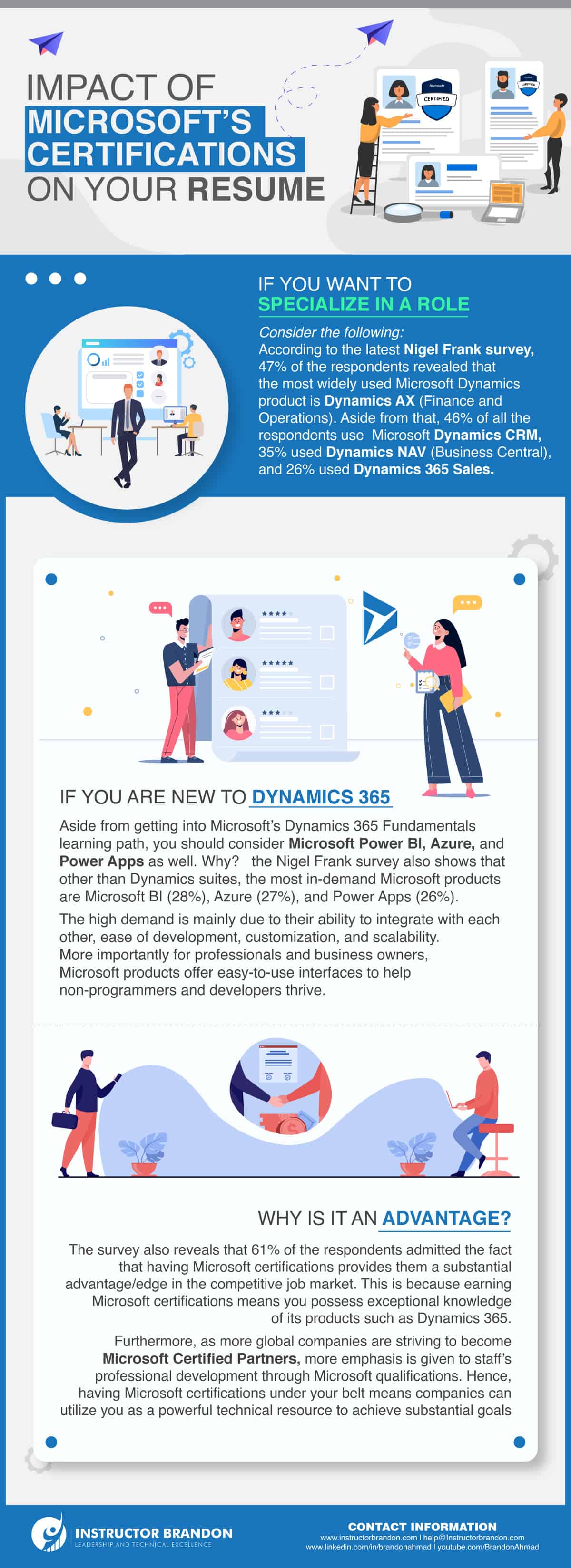Training
How will Microsoft Certification help me career wise
Back in late 2016, when Microsoft released Dynamics 365, no one would’ve thought of how big it was going to get. In hindsight, five years afterward, Dynamics 365 became one of the premier solutions for businesses looking for a cloud-based ERP system. How will Microsoft Certification help me?
Today, we want to talk about the impact that Microsoft’s Dynamics 365 Certifications could have on your career. Furthermore, we also want to show you the trends in adoption and forecasting for employment in the IT industry’s near future.
Here’s an overview of what you will find in this article:
- Impact of Microsoft’s Certifications on your CV
- Trends on Employment for the IT Industry
- Working on-site vs. Working on the cloud
- Microsoft Dynamics 365 Career Path
- Takeaway: Microsoft’s Certifications for your Career
Impact of Microsoft’s Certifications on your CV

Here’s the deal, are you someone experienced with Dynamics-related technologies? On the other hand, are you a self-directed, self-taught professional looking to widen your professional horizons?
- Do you have experience? You want to further your career by specializing in one of Microsoft’s role-based learning and certification paths.
- If you do not have experience, you want to further your career path by learning how to work around Dynamics 365 and its fundamental aspects.
Specialize in a MS Dynamics 365 role
Consider the following, despite your choice. Dynamics professionals come from different backgrounds and fulfill other responsibilities within companies. However, 47% of respondents from the latest Nigel Frank survey revealed the most used Microsoft Dynamics product is Dynamics AX (Finance and Operations). Aside from that, 46% used Dynamics CRM, 35% used Dynamics NAV (Business Central), and 26% used Dynamics 365 Sales.
Do you see what we’re getting at? There is a very evident trend towards using certain Dynamics 365 products. What do you think this means for hiring trends? Of course, they relate to each other. Meaning, you should consider these particular products when you take a specialization of your choice.
If you are new to Dynamics 365
Now, let’s say that you do not have any experience with Dynamics 365 whatsoever. How do you learn? How do you leverage that into a boost for your CV? Besides getting into Microsoft’s Dynamics 365 Fundamentals learning path, you should consider Microsoft Power BI, Azure, and Power Apps. Why? According to the same survey, other than Dynamics, the most in-demand Microsoft products were Microsoft BI (28%), Azure (27%), and Power Apps (26%).
Can you guess why these specific products have such a demand? Mainly because of their ability to integrate, ease of development, customization, and scalability. Essential for business owners, their user interfaces are easy to understand for non-programmers and developers. Ultimately, this allows executives within companies to make accurate, informed decisions with the best outcomes.
Why is it an advantage?
Moreover, 61% of this survey respondents admitted that having these certifications gives you a substantial advantage in the job market. How? It is rather apparent that if Microsoft gave you a certificate, you have a certain Dynamics knowledge level. Furthermore, as more companies strive to become Microsoft Certified Partners or enhance their staff’s qualifications, having a team with these certifications counts towards those goals. If you would like to learn more about Microsoft’s learning paths and how to get your certificates, stay with us. We will be discussing this in detail further below. Moreover, you can always find valuable information in our posts about training and certifications.
Do you want to specialize in a role? Consider Dynamics AX, Dynamics CRM, Dynamics NAV, and Dynamics Sales.
Are you new to Dynamics 365? Aside from Dynamics 365 Fundamentals, consider learning about Microsoft BI, Azure, and Power Apps.
If you want to take advantage: Consider that Microsoft’s Certifications are necessary for those businesses trying to become Microsoft Certified Partners. Moreover, there are tons of functional experience and knowledge to earn in resources such as our courses.
Working on-site vs. Working on the cloud
It just takes a look to realize why migrating to the cloud is so attractive for companies all over the world right now. Even before the confinement, there was an increasing trend towards migration to the cloud. Nevertheless, with the current situation, that trend has only become more prevalent, if not the rule for companies.
-
Remote work
Although we cannot fathom the pandemic’s future impact throughout the world, we can at least analyze what is happening with remote working trends right now. On average, 25% of Dynamics professionals worked at least one day remotely, whereas 22% worked remotely in a full-time format. However, as much as 30% never had this benefit.
How does this translate? Well, it should not come as a surprise that 90% of Dynamics professionals working in a permanent position have had work outside of their contracted hours. Think about it, 9 in 10 Dynamics professionals have had to work overtime. It would be brutal for companies that worked on an on-site basis. Why? Unlike the company’s actual operations, managing your supply chain and the enterprise resources is 24/7, 365 days of the year work. Not to say that companies are exempt from paying overtime if you work remotely; instead, that dealing with on-site costs is a steeper challenge.
-
On-site work
Having a business is a challenge on its own, and that does not even account for having to implement sanitation and health safety protocols. According to the evidence found in a Washington Journal research piece of the last year, compliance with health and safety is costly. For example, T-Mobile had to spend $50 million on cleaning and safety equipment. Walmart had to invest $3 billion in salaries and employee benefits. What is the worst thing? Investing millions and millions without certainty about consumer’s demand.
First, remote work can save millions in companies’ safety expenses, although part of the supply chain could rely on on-site operations. Secondly, the latest State of Remote Work Survey from Hubstaff found that companies find remote work more productive. 84.5% of them plan to keep the format after the pandemic. Moreover, 58.25% of the surveyed plan to combine remote work and on-site arrangements, whereas only 15.5% plan to go back to full-time in the office. Do you understand why this is the moment to take the step forward? As a Dynamics 365 professional and as business owners, we have to embrace the change in work paradigms of today.
Trends on Employment for the IT Industry
Now, let’s look at the two sides of the coin. What leads Dynamics professionals to new employment opportunities? What is leading employers to hire more and more Dynamics professionals?
1. For employed Dynamics professionals
Yes, money is indeed a factor. However, there’s a distinction to be made between Dynamics professionals looking for a new, better position and professionals that are currently unemployed. For employed Dynamics professionals, getting a certification is about increasing their earning potential. However, you may not necessarily look forward to leaving your company; you may be trying to ascend positions or receive a raise. In that case, 87% of the surveyed consider that having experience with a specific industry vertical leads to a better earning potential. Closely behind, 80% of the surveyed believe that the most important thing is a Dynamics certification.
2. For unemployed Dynamics professionals
When it comes to unemployed professionals, career progression, salary, and benefits drive them to acquire Microsoft Certifications. Interestingly, professional advancement seems to be more important than salary. Now, for employers, it is a matter of how attractive your resume is, based on your soft skills and, yes, your certifications. In terms of certificates, employers reported that the credentials that enhanced a potential employee the most were: Business Applications (49%), Cloud (38%), and Dynamics 365 Sales (28%). Whereas the soft skills sought were problem-solving (46%), analysis and research (36%), and communication and teamwork (32%).
3. Leverage the trends
Now, how do we leverage that information? We have to understand the needs of end-users and their reasons for migrating to Dynamics 365. In that sense, most of the projects in which you will work, which were 14 months long on average, were about migrating from on-site premises to the cloud via Azure. Why? Because the user adoption trends suggest that 48% of Dynamics instances were still on-premise. Nevertheless, when asked about their reasons for upgrading to Dynamics 365, the answers were surprising beyond the adoption trend. About 79% of respondents wanted to take full advantage of the new features, 48% wanted to improve productivity in their business, and 38% wanted to move their operations to the cloud.
It is something to keep in mind when reflecting on our future career path related to Dynamics 365. We have to adapt to the trends and use them as leverage for our careers.
Microsoft Dynamics 365 Career Path

Going back to our previous point about the most sought-after roles, let us discuss how the learning and certification path works for Dynamics AX (Finance and Operations), Dynamics CRM, Dynamics NAV (Business Central) Dynamics Sales.
-
Microsoft Dynamics AX (Finance and Operations)
This is the learning and certification path:
- Acquire the Dynamics 365 Fundamentals Finance and Operations Apps Certification by taking the MB-920 The learning path will give you knowledge on Dynamics 365 Supply Chain Management, Finance, Commerce, Human Resources, and Project Operations.
- Now, you can earn the Dynamics 365 Finance and Operations Apps Developer Associate Certificate by taking the MB-300 and MB-500 The MB-300 exam will test your ability to use standard functionalities and implementation tools, whereas the MB-500 will test your ability to plan, architecture and design business solutions.
- Here’s the catch; although the learning path will give you excellent knowledge, it does not suffice when it comes to functional experience unless you pay for ILT (instructor-led training). If you want MCT (Microsoft Certified Trainer) instruction and hands-on experience working with projects, it can be hard to find these opportunities to get your certificates. Moreover, given the steep prices. Check our MB-300 and MB-500 courses and determine why our students are more than likely to obtain their Microsoft certification after completion.
-
Microsoft Dynamics CRM
The learning and certification path goes as follows:
- First, you’ll want the Dynamics 365 Fundamentals Customer Engagement Apps Certification. To obtain it, you have to take the MB-910 The learning path will give you knowledge on Dynamics 365 Sales, Customer Service, Field Service, and CRM Project Operations.
- Do you remember we told you to consider learning about the Power Platform? Here’s why. To obtain the Dynamics 365 Customer Service Functional Consultant Associate Certification, you need to take the PL-200 and MB-230 The PL-200 exam will test you on your ability to configure common data services and create apps using Power Apps. The MB-230 exam will test you on your ability to manage cases and knowledge management, implementing omnichannel for customer service, and analytics management.
-
Microsoft Dynamics NAV (Business Central)
For this learning and certification path, the road is much more straightforward:
- To obtain the Dynamics 365 Business Central Functional Consultant Associate Certification, you need to take the MB-800 The learning path will get you started with Dynamics 365 Business Central, teach you how to deploy and configure the app, work with the user interface, setup Business Central for reporting, and set up financial management from Business Central.
- The MB-800 exam will measure your ability to set up Business Central, configure financials, sales, purchase, and perform Business Central operations.
-
Microsoft Dynamics Sales
Again, this is a more straightforward learning and certification path:
- To obtain your Dynamics 365 Sales Functional Consultant Associate Certification, you need to take two exams, PL-200 and MB-210. The learning path will give you fundamental knowledge on Dynamics 365 Sales, prepare you to deliver analytics reports with Power BI, and teach you how to implement goal management with Dynamics 365 Sales and Customer Service.
- You may recognize PL-200 from the CRM path; it will test your ability with the Power Platform. The MB-210, on the other hand, will test your ability to configure and manage core sales entities and configure tools and services.
Takeaways: How Microsoft Certifications Will Help Your Career?
It might be something that many people do not know. Do you want to know a little secret, something that employers in the IT industry value more than what people may think? Whether you have contributed to the Microsoft community or not. Moreover, for those whose contributions are exceptional and who have repeatedly demonstrated their leadership, there is the Microsoft Community MVP Award.
Contribution to the Microsoft Community is not just an opportunity to obtain a cute virtual award, even if you do not get the MVP Award. In reality, it shows commitment to helping and the degree of knowledge within the Microsoft community. It does affect how your employer will perceive you as well.
Lastly, take into consideration that your learning and certification path will give you actual certificates. Use them! Understand that the hiring process has evolved, and nowadays, it is crucial to define your skills and expertise and include your hard-earned certificates on your CV. LinkedIn is fantastic when it comes to displaying these kinds of e-certificates. Beyond that, optimize your CV for Applicant Tracking Systems, make sure to add keywords related to your Dynamics 365 expertise, and indeed, you will rock that interview.
Thank you for reading our post: How Will Microsoft Certification Help me Career Wise? If you have any questions, leave us a comment in the section below, we will reply as soon as possible. Do not also forget to visit our blog section to learn more about the perks of Microsoft Certifications.
[sc_fs_multi_faq headline-0=”h2″ question-0=”What is the impact of Microsoft’s Certifications on your CV?” answer-0=”First, there are the increasing trends for Dynamics 365 employment. Second, 61% of Nigel Frank’s survey respondents claimed that having a certification made an employee more attractive for hiring. The incidence was even more prevalent with Microsoft Certified Partner companies.” image-0=”” headline-1=”h2″ question-1=”Why are Microsoft Certifications an advantage on the job market?” answer-1=”It is a requirement for Microsoft Certified Partner companies. It is also helpful in enhancing IT personnel qualifications since the certifications give an accurate measurement of the employee’s skill set.” image-1=”” headline-2=”h2″ question-2=”What else should I learn besides Dynamics 365 Fundamentals?” answer-2=”Aside from Dynamics 365 Fundamentals, consider learning about Microsoft BI, Azure, and Power Apps. These were the Dynamics 365 related technologies more sought after in the survey.” image-2=”” headline-3=”h2″ question-3=”What are the most popular Dynamics 365 career paths?” answer-3=”Dynamics AX (Finance and Operations), Dynamics CRM, Dynamics NAV (Business Central), and Dynamics Sales.” image-3=”” headline-4=”h2″ question-4=”What are the soft skills that employers look for in Dynamics 365 professionals?” answer-4=”Problem-solving (46%), analysis and research (36%), and communication and teamwork (32%).” image-4=”” count=”5″ html=”true” css_class=””]You can also reach out to us here if you have any questions concerning our products. We want to ensure you get the best quality, so any feedback is also appreciated. This has been Brandon Ahmad, founder of Instructor Brandon and Dynatuners.

 4767
4767 
